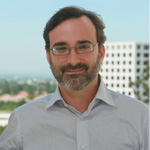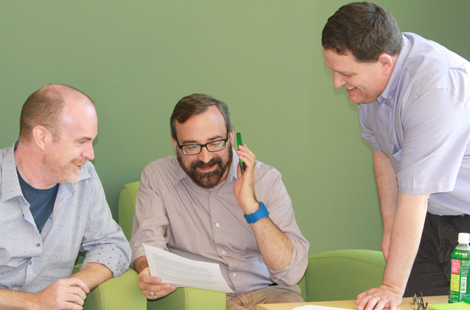Social services

Social services
- December 3, 2012
- Intel Science & Technology Center for Social Computing, co-led by anthropologist Bill Maurer, provides window into the future of social computing
-----
 Sandwiched between the room-sized computers of the 1940s and the smart phones currently
in millions of pockets worldwide is an era of unprecedented technological advancement.
Sandwiched between the room-sized computers of the 1940s and the smart phones currently
in millions of pockets worldwide is an era of unprecedented technological advancement.
Equally significant is the associated social revolution. A new multidisciplinary center headquartered at UC Irvine will devote the next five years to examining the sometimes underestimated social impacts of the digital age.
The Intel Science & Technology Center for Social Computing, launched last June, is part of a five-campus collaboration funded by a $12.5 million grant from semiconductor giant Intel. Cornell University, Indiana University, the Georgia Institute of Technology and New York University are partners in the research.
Led by UCI informatics professor Paul Dourish, anthropology and law professor Bill Maurer, and Intel’s Scott Mainwaring, the center is dissecting the social aspects of computing trends from multiple vantage points along the disciplinary divide.
By examining and building on past techno-social trends, the center is taking a giant step toward better understanding next-generation computing.
Academic and Intel researchers work side by side to provide a window into future products, platforms, policies and practices.
“Our research will indicate what is happening now and what things are on the horizon five or 10 years out that we should all be thinking about now,” Maurer says.
The key message: computing involves much more than the hardware itself. Behavior and technology play tag in the march toward newer, faster and better. Technology presents opportunities that inspire certain behaviors; these behaviors continually influence the design of new technologies.
Case in point: SMS (text messaging) was created to fill small leftover spaces in digital packets. Those short messages led to Twitter’s 140-character missives, which impact culture, politics and daily life in ways we couldn’t have imagined.
“It’s never just what the technology does nor is it just what people do,” Dourish says. “They both build on the other.”
Researchers say a multidisciplinary perspective is crucial to a full understanding.
“Our starting point is what people are doing in the real world, and those activities are not constrained by a series of arbitrary definitions,” Dourish says. “Having broader-based teams gives us much more powerful leverage.”
In addition to computer scientists and anthropologists, center-affiliated researchers include cognitive scientists; engineers; culture, gender and media studies experts; and philosophers.
“We’re building a network of researchers that brings together unexpected and unanticipated connections – whatever’s on the edge of this broad domain we’re calling social computing,” Maurer explains.
Adds Dourish: “We want to allow for these interactions, these unexpected collaborations and new ideas to come out. Part of the trick over the next few years will be making sure we can leave space for the creative and unexpected to keep on happening.”
-Calit2 Communications
-pictured left to right: Dourish, Maurer, Mainwaring
-----
Would you like to get more involved with the social sciences? Email us at communications@socsci.uci.edu to connect.
Share on:
Related News Items
- Careet RightLopez-Rodriguez awarded Educational Enhancement Scholarship
- Careet RightGood Authority's top 10 posts of 2025
- Careet RightFabric of Pittsburgh: The Terrible Towel went from 'gimmick' to changing two generations of fandom
- Careet RightSoCal business owner says Meta's AI security system incorrectly banned her store's Instagram account
- Careet RightPeng Peiyun, 95, dies; official renounced China's one-child policy


